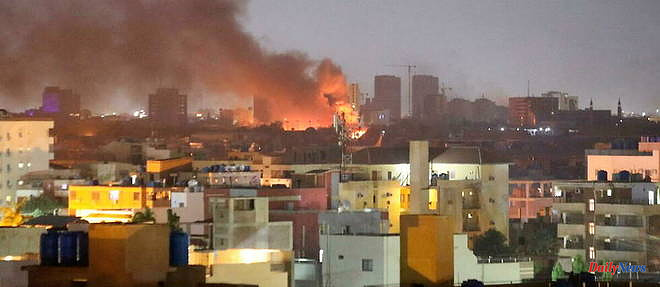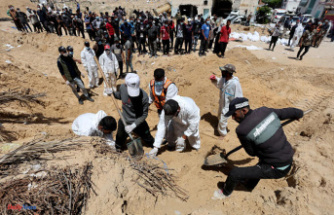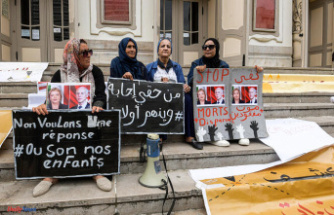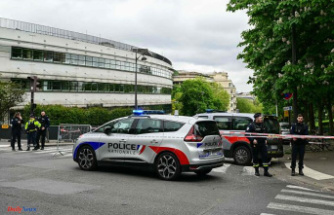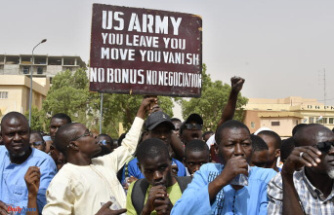Fighting continues in Sudan between General Abdel Fattah al-Burhane's army and General Mohamed Hamdane Dogolo's powerful paramilitary force. Monday, April 17, nearly a hundred civilians have already been killed, in a country where gunfire and explosions have rocked Khartoum continuously for three days.
For weeks, the conflict had been latent between the two men, who together ousted civilians from power during the October 2021 putsch before turning their weapons against each other on Saturday morning. Since then, the fighting with heavy weapons has not ceased and the air force regularly targets, even in the middle of Khartoum, the HQs of the Rapid Support Forces (RSF). These ex-militiamen of the very deadly war in Darfur who have become the official auxiliaries of the army are, everywhere in fatigues and in arms, fighting step by step to take control of the military and political infrastructures of the country.
And civilians are paying a heavy price for this conflict for power. The official doctors' union counts at least 97 dead among them: 56 on Saturday and 41 on Sunday, about half in the capital. Doctors also claim that "dozens" of fighters have died, although neither side has announced any casualties.
The army assured Sunday evening that the situation was "extremely stable" and that the fighting was "limited", while the FSR said they were "on the way to winning definitively".
This Monday, it is impossible, in fact, to know which force controls what. The FSR announced that they had taken the airport on Saturday, which the army denied. The paramilitaries also claim to have entered the presidential palace, but the army denies it and above all claims to hold the headquarters of its staff, one of the main power complexes in Khartoum.
As for state television, the two parties also claim to have taken it. But the inhabitants of the surroundings report continuous fighting while on the air only patriotic songs are broadcast, as during the putsch.
While no truce or outcome is emerging in the immediate future, doctors and humanitarians are sounding the alarm: already in normal times, homes are only supplied with electricity for a few hours a day. In some districts of Khartoum, it has been completely cut off since Saturday, like running water. And the few grocery stores that open warn that they will only last a few days if no truck of goods can enter the capital.
Patients, sometimes children, and their relatives "have no more food or drink", warns a network of pro-democracy doctors, who say they can no longer let treated patients leave safely, which creates "a bottleneck that prevents from taking care of all".
And the three-hour "humanitarian corridors" announced on Sunday afternoon by the two belligerents did not change the situation: during all this time, explosions and shootings did not stop in Khartoum. Volker Perthes also said he was "extremely disappointed" that the army and paramilitaries had only "partially respected" the "humanitarian truce" they had said they accepted on Sunday, the day after the start of hostilities.
With more than a third of Sudan's 45 million people in need of humanitarian aid before the recent outbreak of violence, the World Food Program (WFP) on Sunday suspended aid after three of its staff were killed in the fighting in Darfur, in the west, raising fears of the worst in a country where hunger has continued to grow.
In Khartoum, bathed in the smell of gunpowder, residents are still barricaded in their homes as columns of thick black smoke continue to rise from the city center, where political and military institutions sit.
"It is the first time in the history of Sudan since independence [en 1956, NDLR] that there is such a level of violence in the center, in Khartoum", assures Kholood Khair, who founded the center. Confluence Advisory research center in the capital. "Khartoum is the historical center of power and has always been the safest place in Sudan during the deadly rebel wars" launched in Darfur and elsewhere in the 2000s, continues the specialist.
"Today the fighting is all over the city, the RSF are everywhere, and especially in densely populated areas, because the belligerents believed that the possibility of a high civilian death toll would deter the other side: now , we know that their power struggle at all costs won, ”she continues.
The international community has been increasing calls for a ceasefire since Saturday: on Sunday, the Arab League and the African Union met urgently to demand the cessation of hostilities and the return to a "political solution", an option that does not has so far not led to a return to democratic transition in Sudan, which only emerged in 2019 from thirty years of Islamic-military dictatorship.
On Monday, Washington and London called for an "immediate cessation" of the violence. "All of our partners strongly believe in the need for an immediate ceasefire and a resumption of talks," US Secretary of State Antony Blinken said after meeting with the British minister of Foreign Affairs, James Cleverly. "There is a strong shared concern about the fighting, the violence that is taking place in Sudan, the threat this poses to civilians, to the Sudanese nation and even potentially to the region," he continued.
“We ask them to prioritize peace, end the fighting and resume negotiations. This is what the Sudanese people want, this is what the Sudanese people deserve. All our partners are firmly convinced of the need for an immediate ceasefire and a resumption of talks,” Antony Blinken later said.
Antonio Guterres, Secretary General of the UN, for his part, called on the two belligerents as well as Egyptian President Abdel Fattah al-Sisi to demand "an immediate end to the violence". Just like Moscow, Paris, Rome, Riyadh, the European Union or former Prime Minister Abdallah Hamdok.

